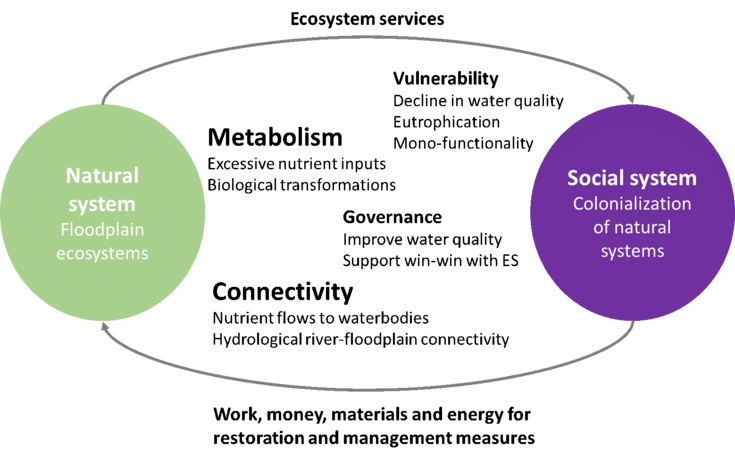Effects of floodplain restoration on nutrient retention and ecosystem services on reach and catchment scale
SUPERVISOR: Thomas HEIN
PROJECT ASSIGNED TO: Martin TSCHIKOF
River floodplains are among the most diverse and productive ecosystems on earth and provide vital ecosystem services (ES). For example, they contribute to the river’s self-purification ability and mitigate eutrophication events by retaining nutrients through diverse biotic and abiotic processes. However, floodplains and adequate water quality are globally under great threat. In the Danube river basin (DRB), more than 70% of the area have already been lost and remnants are widely disconnected from the hydrological riverine dynamics resulting in a loss of ES (e.g. habitat provision, water purification, flood protection, recreation). Consequently, there is a need to restore floodplains in the DRB considering their water purification function and synergies among ES to conserve their multi-functionality.
The main objectives of my PhD are to quantify the nutrient retention in large floodplains on different scales, assess controlling factors and the impact of restoration measures to eventually integrate a deeper understanding of this function into the ES framework.
The first task deals with the evaluation of side-arm reconnection measures as a sink for nutrients in the Donau-Auen national park in Austria (https://doi.org/10.3389/fenvs.2020.00074). A statistical model to calculate a mass balance is compared to a larger scaled semi-empirical model and resulted in similar results. The increased lateral hydrological connectivity after reconnection is a key driver for the nutrient retention function, showing also clear synergies with habitat provision and selected cultural ES.
The second task shifts the perspective to the entire DRB. Using recent nutrient flux estimates by the MONERIS model and European geodata, I provide a first estimate of the capacity of large active river-floodplain systems in removing nitrate from the rivers and to evaluate the potential effect of floodplain reconnection measures on a larger scale.
The third task aims to incorporate the gained knowledge about the nutrient retention on catchment-scale into other ES assessments of floodplains, by analysing their synergies and trade-offs in selected management scenarios. Overall, this thesis advances the current knowledge about the abilities and limitations of floodplains and their restoration to retain nutrients and provide ES. The findings may inform managers and stakeholders about the multiple contributions of healthy floodplains for human wellbeing and facilitate future decision-making processes.
Link to HR21 research clusters: My research is linked to all research clusters mainly focussing on the clusters “metabolism” and “connectivity”.

Graphical scheme illustrating the integration of my PhD research into the HR21 concept. The importance of the 4 HR21 research clusters “metabolism”, “connectivity”, “vulnerability”, and “governance” is represented by font size.
Funding project: IDES - Improving water quality in the Danube river and its tributaries by integrative floodplain management based on Ecosystem Services, Danube Transnational Programme, Interreg Danube (interreg-danube.eu)
